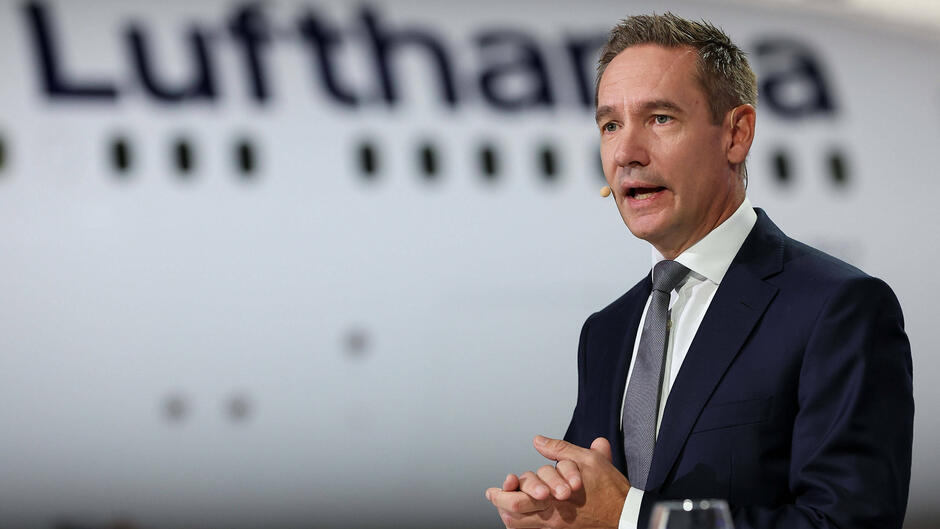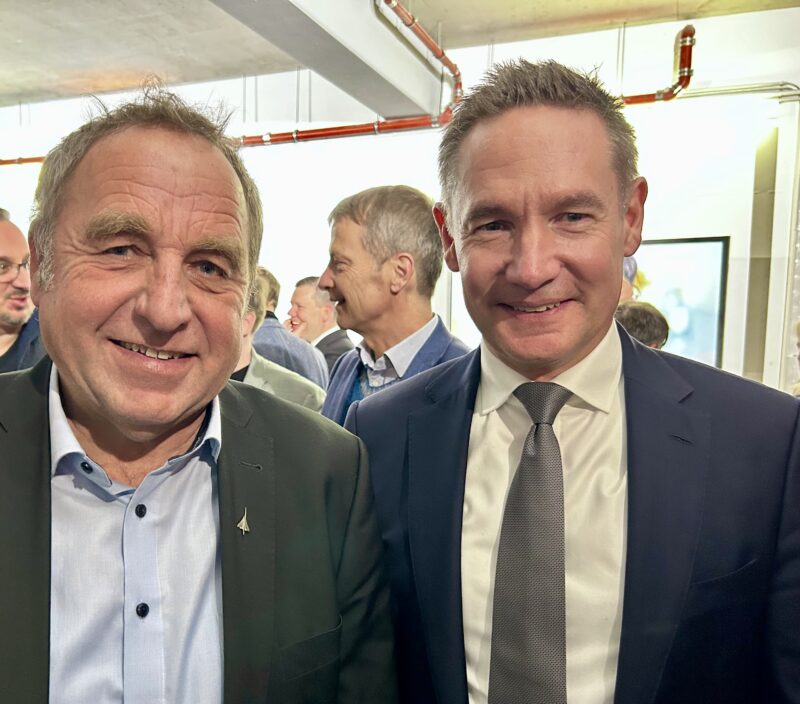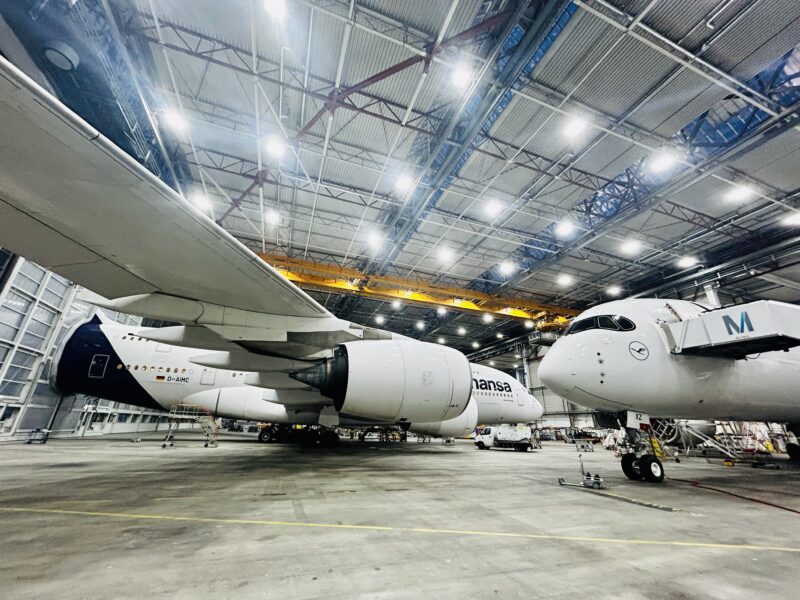
After a challenging year in 2024, especially in terms of punctuality, Lufthansa is investing 200 million euros this year to stabilize flight operations. During a media briefing in Munich, correspondent Kurt Hofmann spoke with Lufthansa Airlines CEO Jens Ritter.
Investments and Measures
Brand-new and just approved by the aviation authorities – Lufthansa’s latest addition to the fleet, Airbus A350-900 “Solingen” with the registration D-AIXZ, is in the line maintenance hangar in Munich waiting for its first commercial flight to Bangalore. This aircraft, its fourth, is equipped with the new Lufthansa Allegris cabin, with its new First Class, a product that the CEO of Lufthansa Airlines, Jens Ritter, has high hopes for.
Why was the new A350 with Allegris First Class deployed to Bangalore and Mumbai and not to the USA? “The USA stipulates that a new commercial aircraft must first be in service for a month before it is allowed to fly into US airspace,” Ritter said.
Jens Ritter explains important and decisive factors for keeping Lufthansa competitive: “After Frankfurt, Munich is the airline’s second most important hub. 37 long-haul aircraft are stationed here alone. But, unfortunately, Munich was not portrayed as positively last year as we would have liked,” said Ritter, who also immediately explained what is being done to ensure the airline’s punctuality and operational quality again.
“In addition to snow chaos last winter 2023/24, including freezing rain and enormous load peaks in summer 2024, all of this presented us and our system partners with enormous challenges,” said Ritter. As a result, significant changes and adjustments were initiated.
Lufthansa Airlines CEO Ritter is now responsible for the Munich hub to oversee its development. Sufficient, qualified, and motivated staff are urgently needed. Lufthansa Airlines has increased its workforce in Munich by 22 percent compared to 2024 and sees itself well prepared for summer 2025. In addition, investments are being made for the further development of employees, who are now multi-qualified and can be deployed in various roles.

Increase Connection Time in Munich by 10 Minutes
In order to be prepared for a strong summer and to ensure punctuality, transfer times in Munich will be increased by ten minutes, knowing well that this can be detrimental to the time-critical competition between global hubs.
The ground times of all aircraft in Munich will be increased by ten minutes to allow more time for cleaning, refueling or loading and unloading. “We are adjusting the times for those flights that are particularly time-critical by up to 30 minutes so that passengers get to their destination on time, but also so that the aircraft get back to Munich,” says the CEO.
The last long-haul flight from the Bavarian hub will take off at 10:20 p.m. so there is enough time buffer until the night flight ban. The Lufthansa check-in area in Munich has been expanded by 30 percent, the baggage system by 22 percent. The security checks have been extensively modified, resulting in a 30 percent increase in capacity.
Lufthansa A380
On the subject of the fleet, Ritter explains that the A380 is still very popular with passengers. “Since January 21, the last A380, D-AIMA, has been back from maintenance in Manila, where it was undergoing its 12-year check,” explains Ritter. In addition to the remaining upgrades in Frankfurt and the obligatory maintenance flights, this A380 is to be transferred to Munich in February.
In the summer of 2025, eight Lufthansa A380s will fly to Los Angeles, New York, Boston, Washington, Delhi and, for the first time, Denver. “A first for Denver, where an A380 has never landed on a scheduled flight before,” says Ritter. Of the eight A380s, six will operate on scheduled flights. To ensure stability, two A380s are in reserve.

New Allegris A350
There are also 30 Airbus A350s at the Munich site, with another one to follow in 2025. All A350s will be equipped with Allegri’s cabin. 14 more A350s are on order in the future.
Six A350s are being temporarily relocated from Munich to Frankfurt because there is a massive shortage of modern aircraft there due to Boeing’s well-known delivery problems. “The older existing fleet is extremely maintenance-intensive, every fifth aircraft is kept as a reserve, which further reduces aircraft capacity,” said Ritter unequivocally.
Efforts are also being made to obtain some 787s from Boeing, which have now been fully painted and equipped with the Allegris product, but are standing on the apron in Charleston. Such 787s could be used with blocked business class seats in the summer and then subsequently obtain certification of the seats. This could gain additional capacity.
“All of these measures cost 200 million euros, which are being invested to create a significantly more positive customer experience,” said Ritter.
Turnaround Strategy
“We want to be one of the best known airline brands in the world and develop it into a premium airline brand, and of course also on the more profitable side. Despite positive developments in recent months, we are not there yet. That is why the turnaround project was initiated,” said Ritter.
“We need to increase quality again, increase efficiency and reduce the extensive complexities in the Lufthansa airline system. The focus is on commercial measures, a clear focus and positioning of flight operations and aircraft types, and the improvement and modernization of operations. “It is very important for me to mention that we are continuing to invest consistently in the product and customer experience.
Over 600 measures have been implemented. Of the current seven flight operations under the Lufthansa Airlines umbrella, we want to focus on three flight operations: Lufthansa Classic, Lufthansa City Airlines and Discover Airlines, as well as a strategic wet-lease partner who supports operations with smaller aircraft,” said Ritter. Lufthansa CityLine’s flight operations will be discontinued, and City Airlines is to grow as much as possible in order to secure profitable short-haul and feeder traffic, as well as to offer prospects for the current CityLine crews.
Lufthansa Airlines’ growth plans are also being reduced. In 2025, the airline will operate at around 90 percent capacity compared to 2019. That corresponds to a 3.5% increase compared to 2024, i.e. moderate growth.
There is also a great focus on maintaining the intercontinental fleet, employee efficiency and increasing revenues. “Fundamental and structural changes are necessary,” Ritter said unequivocally.
Video
Related






